
formance-éf these slender, and popular dbtie£.
He might, it is true, if a man of eloquence,
talents,- or bravery, be also the ruling civil chief
of his! tribe, and furthermore, its war captain in
the field. And such is known to have actually
been the character and standing of Atotarho,
the first presiding chief in their federative councils.
He was a man of energy and high renown;
And such was the estimation in which he was
held in his life time, and the popular vêneration
for his character after death, that/as above denoted*.
his name became the distinctive titlefor
the office. Thus much is preserved by tradition,
and the office and title-of the atotarho;: as
presiding sachem, is Hot yet extinct,, although
the tribès have no longer wars to prosecute, or
foreign embassadors to reply to.
But how, it may be: asked, is a government so
purely popular, and so simple and essentially
advisory in its character, to be reconciled with
the laws of hereditary descent, fixed by the £Üf£
tablishment^öf heraldic devices, and bringing
its proportion of we&k and incompeteni^minds
into office, and with the -actual power it exercised,
and the fame it acquired? To answer
this .question, and to show how the aristocratic
and democratic principles were made to harmonize,
in the Iroquois government, it will be
necessary to go back, and examine the law of
descent among the tribes, together with the curious
and intricate principles of thé ;iatemic bond.
Nothing is more fully under the cognizance
of observers of the manners and customs of this
people,” than the fact of the entire mass of a canton
or:'tribe being separated into distîhçt clans,
e$ch, of them distinguished by the name and
device of some quadruped* bird, or other object
in the animal kingdom. This device is called,
among the Algonquins (where the same sépara^-
{ion into families qr clans exists), totem, and we
shall employ the. term here, as being already well
known to writers, But while the ; Algonquins
have made no otherwise of it, but to trace consanguinity,
or a t least, remote , affinities of fami-
lies, and while they have also separated into
wild independencies and tribes,* who have assumed
new tribal names, and wandered- and
tossed each other’s track and boundaries in a
thousand ways, the Iroquois have turned it to
account by assuming it as the very basis of t^eir
political-and tribal bond, k H ow far fixity oft ten
ritorial possession and proximity of location may
have favored -or led to ,the establishment, of this
new bond, need not be inquired into here ; hut,
while we express no opinion favorable to the
©emote antiquity of their résidence in the north,
{{ must be evident that this tie would have lost
all its binding force if the Alleghanies, the great
lakes, or any other very wide geographical areas,
had been interposed between them, and thus
interrupted fréquent and full intercôurse. and
united action. A government wholly verbal,
must be conceded to have required this proximi